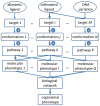Towards structural systems pharmacology to study complex diseases and personalized medicine
- PMID: 24830652
- PMCID: PMC4022462
- DOI: 10.1371/journal.pcbi.1003554
Towards structural systems pharmacology to study complex diseases and personalized medicine
Abstract
Genome-Wide Association Studies (GWAS), whole genome sequencing, and high-throughput omics techniques have generated vast amounts of genotypic and molecular phenotypic data. However, these data have not yet been fully explored to improve the effectiveness and efficiency of drug discovery, which continues along a one-drug-one-target-one-disease paradigm. As a partial consequence, both the cost to launch a new drug and the attrition rate are increasing. Systems pharmacology and pharmacogenomics are emerging to exploit the available data and potentially reverse this trend, but, as we argue here, more is needed. To understand the impact of genetic, epigenetic, and environmental factors on drug action, we must study the structural energetics and dynamics of molecular interactions in the context of the whole human genome and interactome. Such an approach requires an integrative modeling framework for drug action that leverages advances in data-driven statistical modeling and mechanism-based multiscale modeling and transforms heterogeneous data from GWAS, high-throughput sequencing, structural genomics, functional genomics, and chemical genomics into unified knowledge. This is not a small task, but, as reviewed here, progress is being made towards the final goal of personalized medicines for the treatment of complex diseases.
Conflict of interest statement
The authors have declared that no competing interests exist.
Figures





References
-
- Jones SJ (1995) An update and lessons from whole-genome sequencing projects. Curr Opin Genet Dev 5: 349–353. - PubMed
Publication types
MeSH terms
LinkOut - more resources
Full Text Sources
Other Literature Sources
Research Materials

